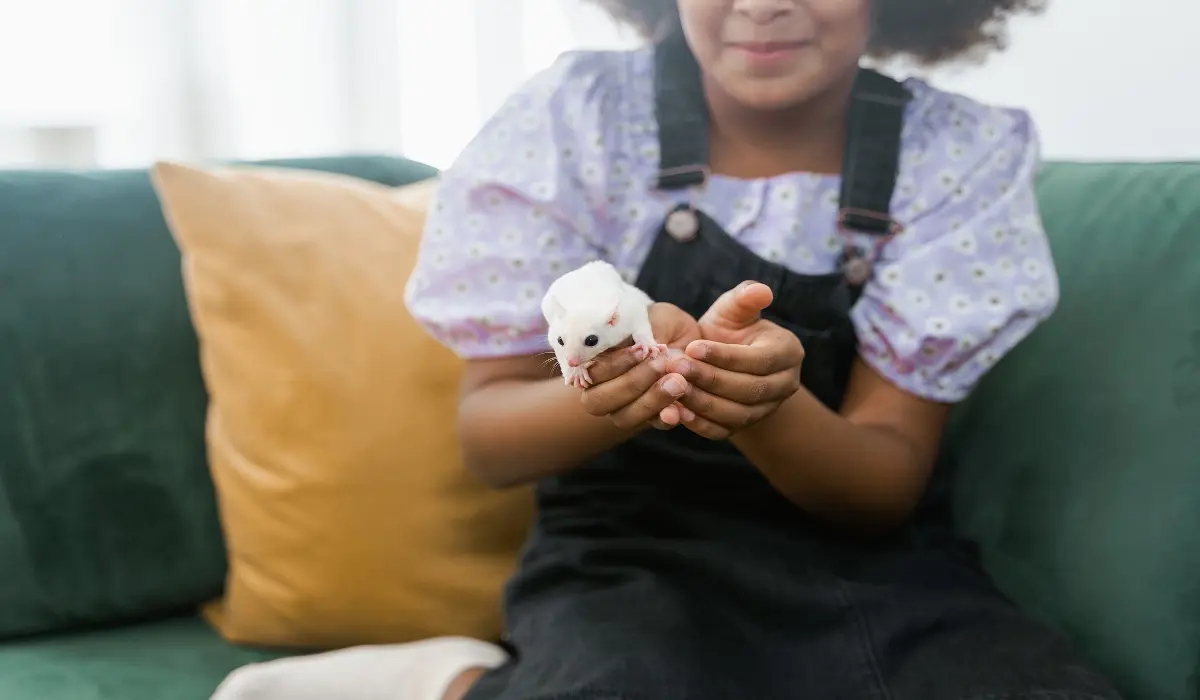Behavioral issues in sugar gliders can be confusing, often presenting challenges to both new and seasoned pet owners. These behaviours, unique to this endearing species, require our understanding for effective intervention.
Taking good care of sugar gliders as a pet is a rewarding experience as these behaviors are unique to them.
With this guide, our goal is to enable a nurturing environment for these wonderful marsupials and foster a rewarding pet-owner relationship.
Overview of Sugar Glider Behavior
If you are interested in owning a sugar glider as a pet or are a new caretaker, the first thing to understand is their typical behavior. This knowledge provides a significant baseline to identify deviations in their behavior patterns, indicating potential issues.
Normal Behavior
Sugar gliders, known for their playful, affectionate nature, entertain their caregivers with their spirited antics. A healthy sugar glider displays high energy levels during their awake hours and indulges in a variety of physical activities like jumping, climbing, and gliding.
Furthermore, sugar gliders are big on social interaction, whether it’s with another glider or with humans. Bonding pouches are their favorite because it’s time for cuddling with their loved ones.
Behavior As Illness Indicator
At times, changes in behavior signal an underlying physical ailment. For instance, lethargy, lack of appetite, and unusual aggression may be associated with diseases. Observing their behavior closely is crucial because early detection of health problems can prevent further complications.
Common Behavioral Issues in Sugar Gliders and How to Address Them
Understanding how to tackle behavioral issues efficiently can go a long way in ensuring a happy and healthy life for your sugar glider.
Aggression
Though naturally social, sugar gliders display signs of aggression when they feel stressed or threatened, or if they have not been socialized properly.
If your sugar glider starts nipping or biting, it might be an outlet for expressing discomfort. Spend more time handling and interacting with your pet, maintain a comfortable living environment, and if required, take them to the vet to rule out any health issues causing the aggression.
Overeating
Overeating is another common behavioral issue that sugar gliders face, mainly if they are bored or anxious. A crucial step in managing this issue is providing a balanced diet and not filling their cage with excess food. Incorporate play sessions to keep them engaged and happy.
Use toys that make them work a little for their food, simulating a natural foraging behavior, which can divert their attention from overeating.
Lethargy
Lethargy is a significant behavioral issue that needs immediate attention. If your sugar glider seems less enthusiastic about their daily activities, you must first consult with a vet to rule out any illnesses.
Additionally, providing them with a diet rich in fruits, vegetables, and proteins, and limiting processed foods can boost their energy levels. Mental stimulation, provided by toys, puzzles, or training sessions, can also alleviate lethargy.
Prevention Strategies for Sugar Glider’s Behavioral Issues
Remember that prevention is better than cure. Besides treating behavioral issues, here are proactive strategies to prevent them from arising.
The Crucial Role of Diet and Exercise
A balanced diet featuring fresh fruits, vegetables, and lean proteins can boost your sugar glider’s physical health and regulate their behavior.
It’s crucial to refrain from giving them human processed foods as they lack nutritional value and can harm your pet. Regular exercise is also important.
Play sessions and free-roaming periods under supervision contribute to their physical well-being and tires them out, reducing the possibility of issues like aggression.
Regular Vet Check-ups
Routine vet check-ups are instrumental in preventing behavioral issues, enabling early detection of potential problems. Make sure to schedule regular vet visits, where the professional can monitor weight and health and offer dietary or behavioral advice as necessary.
Mental Stimulation
Sugar gliders are curious creatures. To keep them mentally healthy and content, integrating a variety of interactive toys and foraging activities in their routine is key.
Regular interactions can build up a bond with your glider, enrich their life, and decrease harmful behaviors.
Socialization
Sugar gliders are social animals. Regular interactions with their caregivers create a robust bonding crucial for their well-being. Developing a trust relationship with your pet through daily handling and bonding can help reduce behavioral issues.
Wrapping Up
Understanding and appropriately managing behavioral issues in sugar gliders is at the heart of responsible pet ownership.
An observant and knowledgeable caregiver who is responsive to their pet’s behavior plays an invaluable role in ensuring their sugar glider’s bright spirit, joyfulness, and overall health.
Remember, commitment, patience, and persistence are key to deal with your sugar glider’s behavioral issues, and in case something appears out of your handling capability, never hesitate to consult a vet.
